That said, the reasons behind such feelings are often more nuanced than they appear. While teachers may seem strict, it does not mean that they have negative feelings towards you.
In this article, we will discuss possible triggers of these emotions along with steps you can undertake for better communication and rebuilding trust so the anxiety “My Teacher Hates Me” doesn’t stifle you. It’s time to transform that fear into confidence and classroom connection.
Why Do Children Feel Like My Teacher Hates Me?
The thinking pattern “My Teacher Hates Me” arises due to misinterpretation, anxiety, and feedback being perceived as negative.
Teachers who have numerous and often significant classes try their best to manage them efficiently, which may come off as cold or strict.
Think through whether any of these apply: Did you arrive to class late? Were you disruptive, unprepared, or absent from the lesson? Help yourself understand why the teacher’s remarks felt sharper than warranted; understanding helps avoid the feeling of being singled out and instead encourages you to stand back and see patterns emerge.
Shifting back from simply identifying feelings and focusing on understanding emotions allows for more rational analysis—clarity concerning human connections, rather than merely labeling emotions as “My Teacher Hates Me.”
How Can Children Talk To Teacher If They Think They Hate Me?
Conversations related to “My Teacher Hates Me” tend to be intimidating but lack clarity regarding disputes that arise, hindering their resolution. Avoid using harsh language—set an emotionally neutral tone via email or after class.
Frame it with ‘you’ statements so they don’t feel personally attacked; hence, at the receiving end, something like: “I’ve sensed…” works better. A less confrontational approach leads to less hate sentiment.
Paraphrasing “I will improve delegation” counters blame without actually detracting from responsibility and enables growth-oriented discussion during interpersonal interactions and targeted narrative correspondence.
Don’t use phrases like “You hate me.” It can worsen the situation. Invite someone who can help balance the dialogue, such as a counselor or trusted adult. That single conversation can replace “My Teacher Hates Me” with understanding and respect.
What If Talking Doesn’t Help?
If, after speaking with your teacher, they still seem distant, don’t lose hope. Try keeping a diary of incidents that capture comments and behaviors with corresponding dates.
Reach out to a school counselor or a caring staff member for support—someone who can facilitate collective discussions or propose strategies to rebuild trust mediation. Parents can also be involved to ensure a supported adult advocate is present during discussions.
Note that most schools have working frameworks concerning student-teacher interactions; utilize them. Simultaneously, consider what you would like to control: participating in classes, submitting assignments ahead of time, and asking questions are some ways most likely to change the classroom atmosphere over time.
A combination of these steps may gradually alter how interactions between teachers and students are viewed In.
In many cases, where one might think, “My Teacher Hates Me,” what happens is that adopting a steady, participatory approach alters pre-established systems, and responding positively shifts matters around, allowing for emotional growth on one’s part.
What Can Make Me More Confident After Feeling Hated?
Your self-esteem takes a hit when the notion, “My Teacher Hates Me,” takes hold. Counter it by celebrating small victories such as answering questions, acing tests, or receiving compliments from peers.
Keeping a daily journal of your accomplishments can go a long way in helping you achieve your goals. Joining study groups and clubs where you feel appreciated also helps boost your sense of agency, contributing to your overall empowerment.
That sense of community helps combat the negative toxicity present in classrooms. You can also transform feelings diaries, turning “My Teacher Hates Me” into notes observing the classroom.
Eventually, you start noticing patterns instead of emotions. Exercising self-affirmations (“I belong here; I learn best when I try”) also aids this shift. Turn hurt into growth; soon enough, “My Teacher Hates Me” loses its power.
Common Queries
Does teacher dislike children behavior?
Dislike is directed to the actions, most often rather than directed towards the individual student. It is essential to distinguish between behaviors and character.
How long should children wait before approaching about being disliked?
Waiting for a couple of days shows the highest respect and helps cool off tension — be mindful not to approach right after an anger-triggering moment, as action pairing due to pain may invoke stronger reactions. My Teacher Hates Me: Should I Tell My Parents
If no steps toward resolving the situation have been practical, empathetic parents can help alleviate some stress.
Can peer relationships play a role when strained student-teacher dynamics exist?
Trusting classmates and participating in constructive, collaborative learning boosts belongingness and helps mitigate stress.
Conclusion
It is common to experience feelings of animosity from teachers; take note that “my teacher hates me.” Instead, understanding your emotions, having respectful conversations, seeking help, and building compassionate resolve turn fears into growth.
With you at the center of the matter, classrooms transform from war zones into safe spaces when trust triumphs anxiety.



